Zip Files Action is a constituent part of Automation Workshop, a Windows automation software. With the Zip Files Action you can automate file compression in various ways.
The goal
The goal of automatic Zip files tutorial. This tutorial will show you how to create a simple Automation Workshop Task to automate a daily zip archival of all files located on a network share to a compressed and encrypted zip file containing the date of archival in its name.
During the creation of the Task, we will assume the following parameters:
- The compression of the files on network share will take place on daily schedule, at 11:30 PM.
- The Zip Files Action will automatically compress files located in
\\SERVER.local\network path.share\ - The name of zip archive will contain the date on which the file archival has taken place.
- The created zip archive will be encrypted with secure AES-256 key and put in
C:\Daily backup\folder.
The tutorial on how to automatically compress files to zip archive consists of the following steps:
- Creation of the Task that includes Task Scheduler for daily launch and Zip Files Action for file compression.
- Adding the Task Scheduler to the Task and configuring it.
- Adding and configuring the Zip Files Action to automatically compress files in above mentioned manner.
Create a Task
Let us begin with creating an automated Task, a functional unit of Automation Workshop. Open the Automation Workshop Manager and choose the New Task option from the File menu. Alternatively, a New Task option can be selected in the context menu of Task Pane or by using CTRL+N keyboard shortcut. Either way, it will open the Task Wizard, an interactive tool for Task creation.
Task Scheduler
Adding the Task Scheduler Trigger for automatic daily Task execution. A Task does not start itself. Instead, it relies on its Triggers that are sets of conditions which, when met, automatically start the Task. Click the Next button in recently opened Task Wizard to go from the Welcome tab to the Trigger tab.
Click the Add button and choose the Task Scheduler in the Add Trigger window.
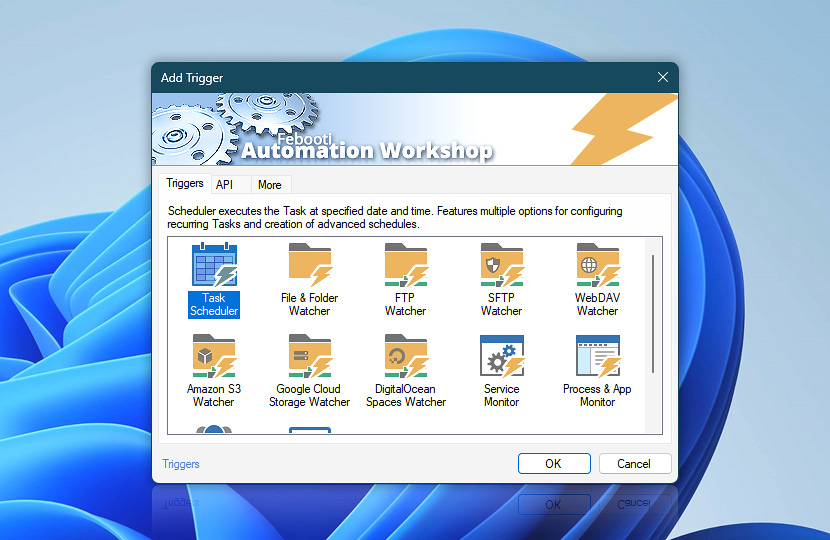
Configure the Task Scheduler for daily execution at 11:30 PM with the recurrence interval of 1 day.
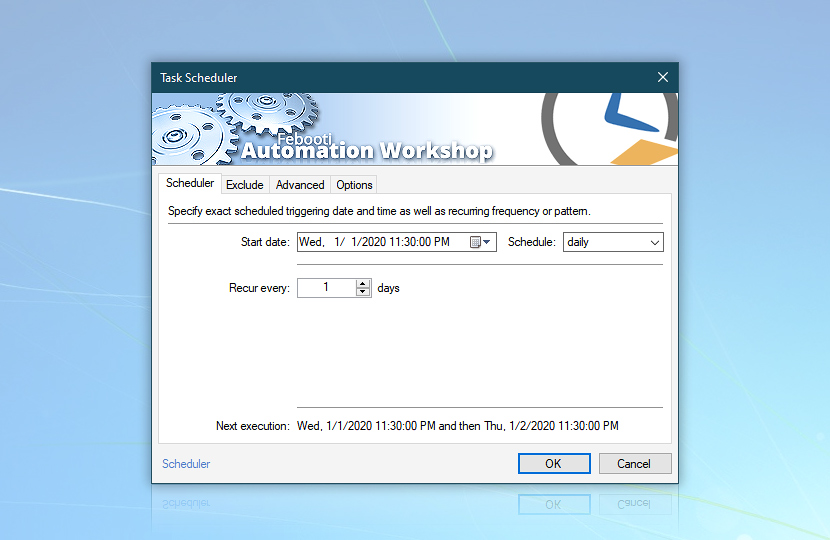
Finish the configuration of the Task Scheduler Trigger and note that it appears in the Triggers tab of Task Wizard.
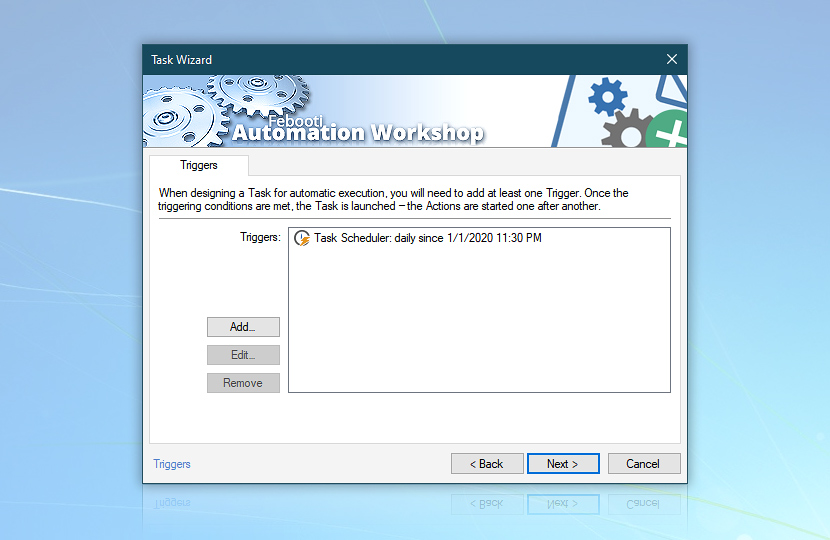
Zip files
Now, when automatic Task execution is scheduled daily at 11:30 PM, click Next to go to the Actions tab of Task Wizard.
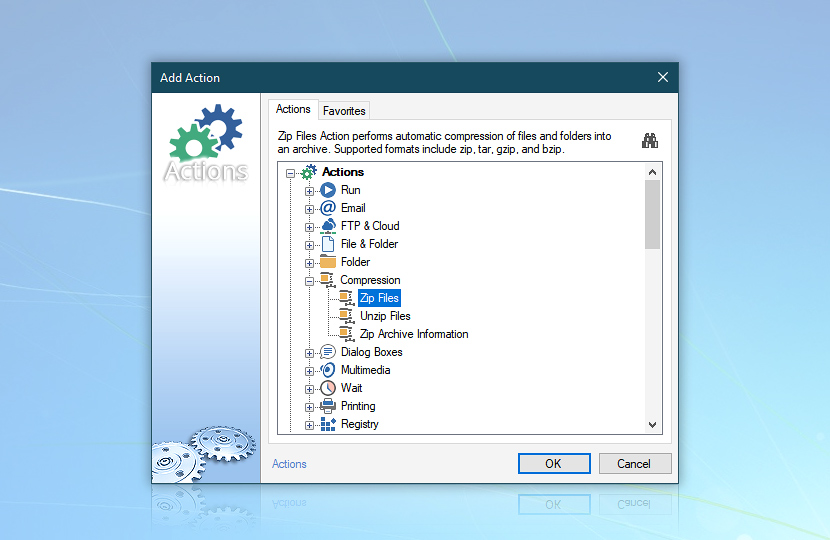
Click the Add button and choose the Zip Files Action in the Compression category in the Add Action window.
Once in the Archive tab of the Zip Files Action, let us first specify the files to compress. Click the Browse button next to the Files to compress field. Browse to \\SERVER.local\ network folder, select any file and confirm the selection. Finally, replace the file name with all files *.* mask.
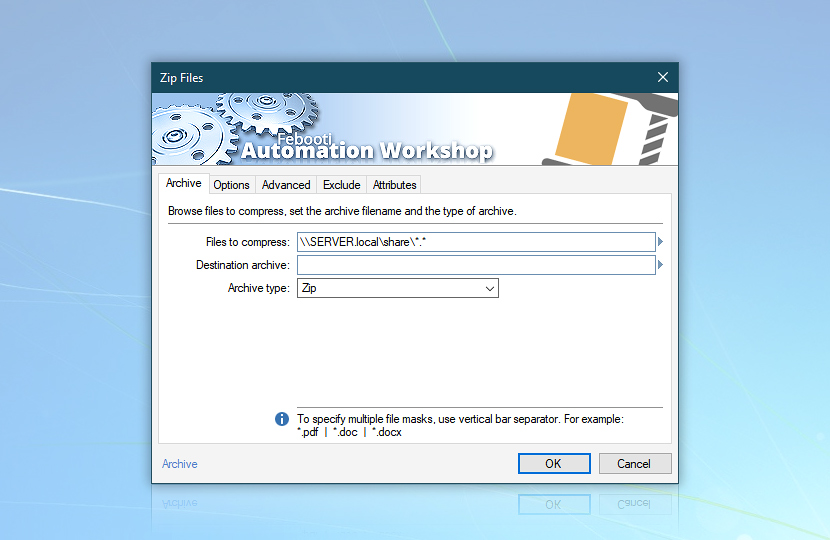
Second, let us specify the destination archive. Browse to or enter the C:\Daily backup\ folder and click the Variable Wizard button. We will have to specify the file name that reflects the date of archiving. Choose the Date variable in the Date & Time category.
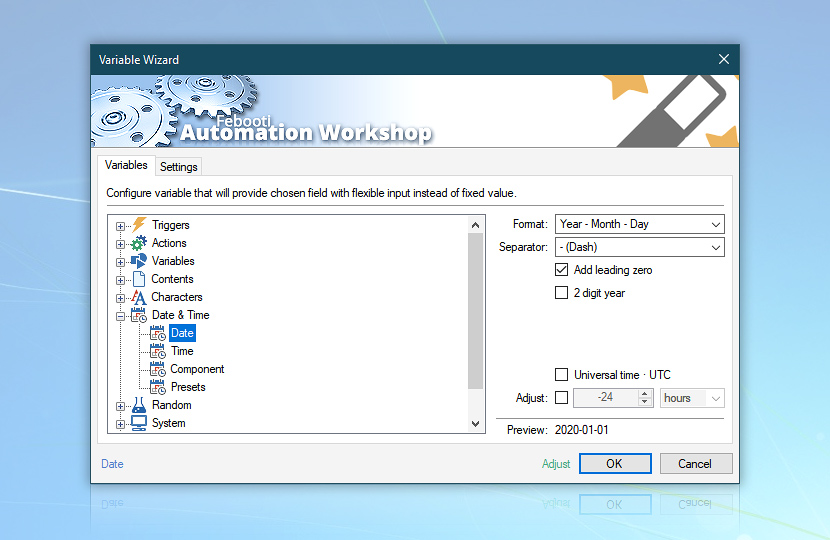
For easier sequential sorting of archive files in Windows, choose the Year / Month / Day format and enable the Add leading zero option. Since the Date variable will be used in file names, only symbols allowed in file names can be used. As slashes are not allowed, change the separator to the - (Dash) character.
![Zip Files: C:\Daily backups\[Date].zip](https://i.febooti.com/i/automation-workshop/tutorials/zip-files-daily-backup-date-zip.jpg)
Protect archive
When the Files to compress and Destination archive parameters have been specified, let us specify the encryption for the archive. Go to the Options tab of the Zip Files Action properties.
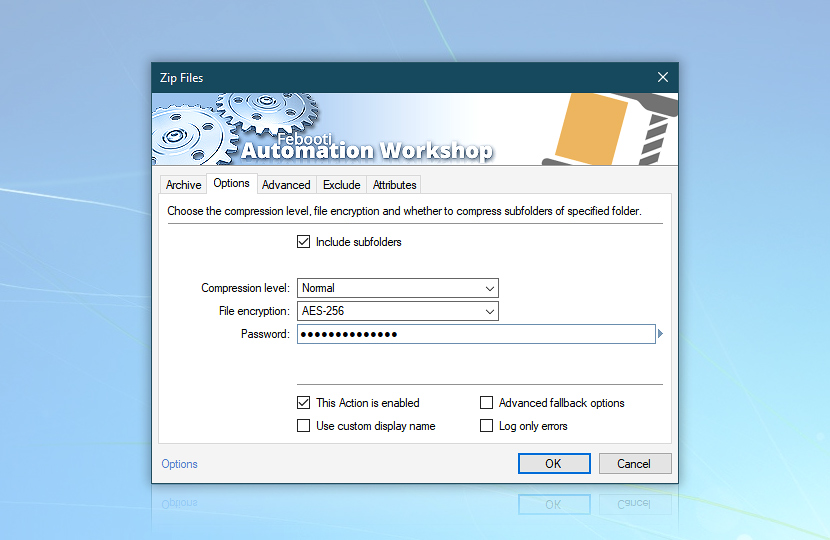
Choose the AES-256 (Advanced Encryption Standard) as file encryption. Use a reasonably long password which is hard to guess (e.g., such password may contain both uppercase and lowercase letters along with numbers and special symbols).
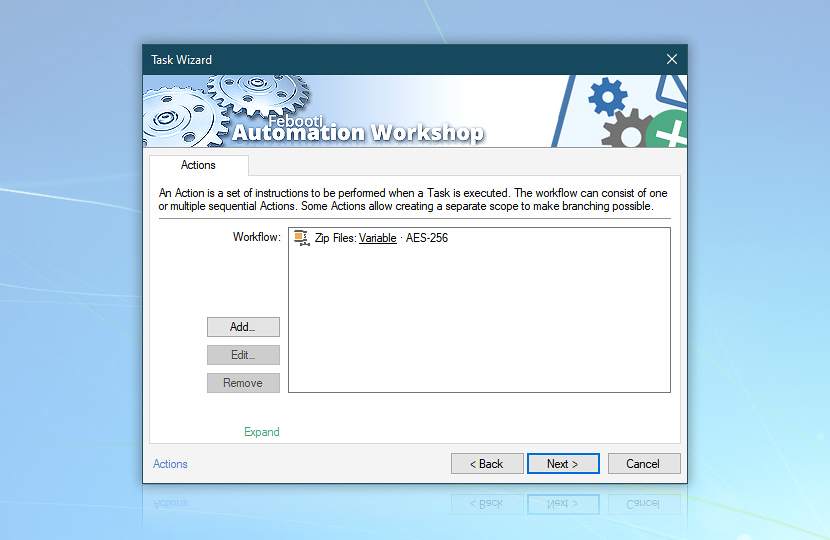
After the Zip Files Action has been added and configured, proceed with the other steps of Task creation, namely, specify the user credentials in Run As properties tab, configure email reports in Reports tab, give task a name and description in Task Properties (e.g., Daily Zip files) and Finish the Task creation.
Summary
The tutorial on zip file automation has shown how to create a Task, add and configure both the Task Scheduler Trigger and the Zip Files Action. The dynamic Date value was used via Variable Wizard as the file name parameter, specifying that the each zip archive instead of having the same fixed name is named differently every day.
Note that this tutorial shows only the basics of using Automation Workshop. The full functionality of automated Tasks (and even particular Task Scheduler Trigger and Zip Files Action) far surpasses the simple use reviewed here. Feel free to try the fully functional trial version of Automation Workshop to see how it can help you to implement Windows processes automation in your company!
Analysis
Zip compression process can be triggered manually, on user request, or automatically, on some system event. For example, file archival can start on schedule, upon detecting a new file in specified folder, at Windows start, user login, or after one of numerous other automation Actions, such as Copy File, Move File, Send Email, and Registry export.
In the Zip Files Action you will find the most up-to-date file compression options.
- Support of the most recent zip file standard.
- Popular Linux, Unix, BSD formats Tar, Tar.gz, Tar.bz2, gz and bz2 are also supported.
- Multiple compression levels (Maximum, Normal, Fast, Store) to choose between faster compression speed and smaller archive file size.
- Support of ultra-secure Advanced Encryption Standard AES-256 and AES-128 keys.
- Insecure legacy PKZIP passwords for less sensitive data are also supported.
- Full Unicode support for file, folder and archive names.
- Large archive support allows creation of archives virtually unlimited in size and the number of files.
- Multi-volume zip file support for splitting archive in equally sized parts.
As the Zip Files Action is designed for automation, it features a number of specific options that are somewhat alike to command line zip version. They too, however, are provided in graphical user interface of Automation Workshop.
- File mask support when specifying files to compress.
- Flexible specification of destination archive.
- Recursively zip all folder contents (including subfolders of the specified folder).
- Exclusion of particular files based on their mask, date, age, or attributes.
- Automatic compression error handling, error reporting and error logging.
Assistance is here…
If you have any questions, please do not hesitate to contact our support team.
